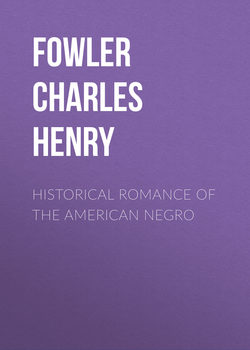Читать книгу Historical Romance of the American Negro - Fowler Charles Henry - Страница 2
INTRODUCTORY
ОглавлениеIn this period of the Negro's development so much has been wielded towards influencing him in the expression of manly sentiment, that when an unhampered and heartfelt defense is made in his behalf by one of his number, it should, and I believe will, secure a universal support by the defenders.
The eagerness to devour books is so prevalent in the present decade that the Anglo-Saxon litterateurs and publishers endeavor to withhold and suppress all that tends to prove the Negro a man and an equal, patting all of their writers and molders of public opinion on the back, who are cringing and palliating with the deceitful exclamation, "Behold, thee! thou art great!" The desire to secure this cowardly approbation has, indeed, become too numerous. Learned men, with ability to withhold the sentiments of their hearts and people, have too frequently sold the golden opportunities of their lives for paltry sums and positions to these literary hawks. But few of the public speakers and writers of these times dare utter the thoughts of Douglass, Turner, Price, Garnett, and that grand galaxy of post-bellum fighters, who knew no middle ground, but stood out for all that the Fourteenth and Fifteenth Amendments to the Constitution had embodied in them. They had no axe to grind, and even so, their oppressed feelings wouldn't permit them have it ground at the expense of the manhood of their four million brothers.
It is high time that the Negro judge whose utterances are fitting and suitable to his case, who stands for his utterances, and which have his sanction, not to allow those hostile to your very existence select, under the guise of friendship, those sentiments put forth by aggrandizing writers and leaders distasteful to you, and brand them as your daily thoughts and hourly prayers. Respect for the sycophant cannot exist long, even among them whom he traitorously serves. A tree is judged by its fruit; so is a race judged by its representative men. If they be honest, the race is placed in the category of men; if wicked, treacherous and deceitful, their place is fixed among the distrustful.
It therefore becomes a small part for us to perform in signalizing the honest writer and leader by giving him our unanimous support. The author has spent months of effort and toil in compiling data and accounts, that Caucasian authors with alertness suppress. He has made a strong case and defense of the Negro's manhood and trustworthiness at a time when most men would have been honest with pain. The simplicity with which his data is compiled and presented to the reader stamps him neither in quest of gold or greatness, but striving to convince the ignorant that heroes and heroines can even be found among this despised race of America, whom some would brand as rapists and thieves. A tale is welded together in which every experience, occurrence and stage is passed through that can occur to a poor, struggling people; yet, no instance presents itself by which the character, the basal part of any people, can be impeached. 'Twill serve as a firer of the ambition and aspirations of the young Negro, and at the same time, so thrilling are its narratives, that 'twill prove as interesting reading matter as many a romance. The eagerness with which our youth devour such tales as relates the better side of his ancestry's life, is too well known to us. The story of Beulah Jackson will fill a long-felt niche in the young Negro's reading matter, that will in itself prove highly beneficial.
JACOB NICHOLSON.
